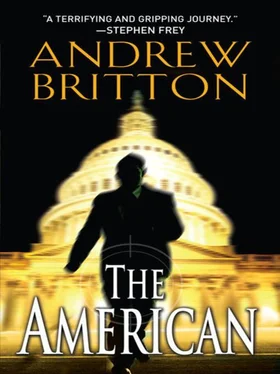Andrew Britton - The American
Здесь есть возможность читать онлайн «Andrew Britton - The American» весь текст электронной книги совершенно бесплатно (целиком полную версию без сокращений). В некоторых случаях можно слушать аудио, скачать через торрент в формате fb2 и присутствует краткое содержание. Жанр: Триллер, на английском языке. Описание произведения, (предисловие) а так же отзывы посетителей доступны на портале библиотеки ЛибКат.
- Название:The American
- Автор:
- Жанр:
- Год:неизвестен
- ISBN:нет данных
- Рейтинг книги:3 / 5. Голосов: 1
-
Избранное:Добавить в избранное
- Отзывы:
-
Ваша оценка:
- 60
- 1
- 2
- 3
- 4
- 5
The American: краткое содержание, описание и аннотация
Предлагаем к чтению аннотацию, описание, краткое содержание или предисловие (зависит от того, что написал сам автор книги «The American»). Если вы не нашли необходимую информацию о книге — напишите в комментариях, мы постараемся отыскать её.
The American — читать онлайн бесплатно полную книгу (весь текст) целиком
Ниже представлен текст книги, разбитый по страницам. Система сохранения места последней прочитанной страницы, позволяет с удобством читать онлайн бесплатно книгу «The American», без необходимости каждый раз заново искать на чём Вы остановились. Поставьте закладку, и сможете в любой момент перейти на страницу, на которой закончили чтение.
Интервал:
Закладка:
The facility lay nestled in a shallow valley, the flat tan buildings blending into the surrounding granite walls that served as natural protection against inbound missiles. The complex was encircled by twin chain link fences topped with razor wire. To the untrained eye, security would have appeared weak, almost nonexistent, but it was there. It could be seen in the weapon-clearing barrels that marked the entrance to each building, and in the camouflage netting that shielded the truck-mounted SA-8 Gecko SAM system. It could be seen in the phase array radar bolted to the command vehicle, and in the bunkers that dotted the perimeter, complete with ammunition stores and grenade sumps. The unmarked minefields that were scattered throughout the open ground south of the facility would have been harder to pick out, as would the early-warning sensors that monitored mountain passes as far as 20 kilometers away.
The convoy was expected, and was not forced to contend with these extensive security measures. Once cleared through the main gate, the vehicles cut an erratic path through the complex. First they passed the four-story structure that served as a barracks for the soldiers, and then the largest building on the compound: the prestressed concrete structure that housed the twin reactors and the smaller steam generators. Beyond the reactor building was the immense cooling tower that served, unbeknownst to the base commander, as a reference point for the NSA satellite control teams at Fort Meade, Maryland.
The vehicles finally slowed to a halt in front of the administration block, a cluster of identical buildings linked by narrow corridors that comprised the northernmost part of the compound. The weary men descended from the vehicles, each stretching in the cool mountain air as a truck-mounted crane was pulled alongside and soldiers were called for to assist in unloading the container. March did not stay to supervise the procedure, instead turning to follow Hamza and the Iranian officer into the cool interior of the administration building.
The hallways all looked alike to March: spotless white walls and freshly waxed pale tile floors, no paintings, no windows. He noticed that the building was missing the usual procession of harried file clerks and overworked administrative personnel. In fact, they passed no one at all on the lengthy walk into the heart of the structure. The silence would have been overwhelming were it not for the gentle, irregular tap of their shoes on the gleaming floor. Finally, the colonel stopped at an unmarked door. He knocked softly, and was granted permission to enter. “Wait here,” he said, and the door closed behind him.
The officer was gone for five minutes. Hamza avoided the other man’s eyes, but knew instinctively that the American was watching him. He found it difficult not to flinch under the penetrating gaze. His mind kept returning to Beheshti, to the mocking tone of the colonel’s voice, to the contempt in the American’s eyes, to the solitary shuttered building that was the harbormaster’s office.
Hamza thought of the sun beating down, cooking the sheets of metal and whatever lay within. He wondered if the flies had yet to find the harbormaster.
The door was pulled open and they were beckoned inside. The interior of the room was a marked difference from the sterile halls. Small, tastefully framed paintings decorated the walls. The carpet was maroon, deep and soft, and expensive-looking armchairs were scattered throughout the space. March noticed that his companion stared as though he had never seen such luxury.
Saif al-Adel was seated on one of the several couches. He stood as they entered the room, the thin smile taut over his narrow features. Hamza was relieved to find him in good humor.
“Welcome, my brother. We were afraid that the desert might have swallowed you whole, along with our American friend here,” he said.
Hamza chuckled nervously and looked to the other man in the room, the Iranian minister Mazaheri. He was wearing full clerical robes, the corners of his eyes crinkling beneath the elaborate turban as he offered his greetings. “You have the container,” he said. It was not a question.
Hamza nodded, and the minister’s smile grew. “You have performed an invaluable service to my country. I have made the other arrangements, as promised. Our South African friend has already delivered your package. You are to be congratulated.” Mazaheri cast a sideways glance at al-Adel, and then focused his attention on the other Egyptian. “Come, my friend,” he said, placing a friendly arm around Hamza’s shoulder. “Share a meal with me. You’ve traveled far, you should rest before the transport arrives.”
Hamza looked to his commander, and received a smile and an approving nod. “He’s right, Hassan. You deserve more than a good meal, though. I would say that it is time to reevaluate your place in the organization. Your reward is long overdue.”
Despite his best efforts, Hamza could not contain the small smile that spread across his lips. He would be made a commander, he would be Saif’s equal… After all these years, it was now a certainty. He went easily, following the minister out of the room, standing tall as he considered the new powers that would soon be his. The smile stretched as an image presented itself to him — it was his name, in large print next to those of al-Zarqawi and bin Laden in the Western newspapers. The image grew in his mind, clouding out all other thought. He would be known, as al-Adel was known. He didn’t hear the minister’s idle chatter, and he did not notice that the American walked far behind with Saif, far enough that they could speak privately.
“You know who I am,” the commander said.
It was a blanket statement, and March did not think it required a response as they moved back through the clean white halls.
Finally, al-Adel continued: “Everything about you concerns me. I make no secret of that. Hassan will only speak well of you, but I am not so easily convinced. I ask of you a single question: what has the West done to you, one of its own, that you would see it burn?”
March considered the question, but only briefly. “You asked me this before, and my answer is the same. Yes, I know who you are. On the other hand, you know what I can do. I ask nothing in return for my actions, only that you provide me with the basic materials that are required for success. What I’ve done in the past, who I am, is not your concern. We will either proceed on that basis or not at all. The decision is yours to make.”
Saif al-Adel looked up as the steel-and-glass doors approached. Hamza and the minister pushed out first, their backs instantly bathed in a red glow from the sun sinking low over the mountains. “You are a brave man to say such things to me,” he said absently. “If I didn’t know differently, I would say you were a fool. You should know that the air force colonel had many good things to say about you. His assignment was not a random choice. He was impressed, and so Mazaheri was impressed. I want to show you something.”
They followed the other two men out into the rapidly cooling air. The minister and Hamza were walking toward the dining facility, leaving twin trails of dusty footprints in the thin sienna topsoil that covered the granite stone of the valley floor. A small group of soldiers stood outside the open doors, laughing and talking as they waited for the meal line to advance.
“I have known Hassan for fourteen years. He is a fellow Egyptian, and has always served the organization well. Two years ago he saved my life in an American ambush, and he wept with me when we were denied the privilege of burying our less-fortunate comrades. For that, and for his service, I love him as a brother.”
March watched as the minister spoke to Hamza, patting him on the shoulder and pointing to an adjacent building as though offering an explanation. March watched Hamza nod in agreement, and Mazaheri began to walk away as the other man continued on toward the dining hall.
Читать дальшеИнтервал:
Закладка:
Похожие книги на «The American»
Представляем Вашему вниманию похожие книги на «The American» списком для выбора. Мы отобрали схожую по названию и смыслу литературу в надежде предоставить читателям больше вариантов отыскать новые, интересные, ещё непрочитанные произведения.
Обсуждение, отзывы о книге «The American» и просто собственные мнения читателей. Оставьте ваши комментарии, напишите, что Вы думаете о произведении, его смысле или главных героях. Укажите что конкретно понравилось, а что нет, и почему Вы так считаете.












